- Home
- Susan Beth Pfeffer
Shade of the Moon ls-4
Shade of the Moon ls-4 Read online
Shade of the Moon
( Last Survivors - 4 )
Susan Beth Pfeffer
The eagerly awaited addition to the series begun with the New York Times best-seller Life As We Knew It, in which a meteor knocks the moon off its orbit and the world changes forever.
It’s been more than two years since Jon Evans and his family left Pennsylvania, hoping to find a safe place to live, yet Jon remains haunted by the deaths of those he loved. His prowess on a soccer field has guaranteed him a home in a well-protected enclave. But Jon is painfully aware that a missed goal, a careless word, even falling in love, can put his life and the lives of his mother, his sister Miranda, and her husband, Alex, in jeopardy. Can Jon risk doing what is right in a world gone so terribly wrong?
Susan Beth Pfeffer
SHADE OF THE MOON
For Miranda and Alex
Their families and their friends
PART ONE
Chapter 1
Wednesday, April 29
“No. Jon. No.”
Jon Evans sat upright in his bed. It was Gabe, he told himself. Gabe must have had a bad dream. He listened for Carrie, Gabe’s nanny, to calm the little boy. He waited to hear Lisa run down the hallway to soothe her son.
But Carrie was quiet. Lisa was quiet. The house was quiet.
It wasn’t Gabe he’d heard. It was Julie.
How long had he known her? A month, six weeks. But he’d been haunted by her for two and a half years.
Jon knew better than to believe in ghosts. Billions of people had died in the past few years. There’d be no room for the living if all the dead were ghosts. And if there were ghosts, there were others Jon would prefer to be haunted by. His father, who died of exhaustion and hunger on the way to Sexton, Tennessee. Jon would welcome his ghost.
But it was Julie’s voice he heard in his sleep. Julie who cried out to him in panic, in anger, her accusations too real, her death too unforgivable.
If the moon’s orbit hadn’t been pushed closer to the earth, Jon would never have met Julie. He’d be a senior in high school, living with Mom back in Pennsylvania. His parents had been divorced long before, but Dad and Lisa and Gabe would be in Springfield, close enough for the occasional visit.
But the moon’s orbit had changed, and the world as everyone had known it had changed in horrific ways. Billions had died from tsunamis, famine, and epidemics.
Dad was one of those billions. His death came a hundred miles before Jon and his family had reached Sexton. They were all half-starved by then, and had neither the strength nor the tools to bury him.
Julie hadn’t died like that. Julie died because of what Jon had done. Of the billions of dead, only Julie was his own. Only she would haunt him.
Jon got out of bed and walked to the window. It had rained all day, and the wind was from the south. The volcanic ash, which ordinarily covered the sky, had thinned as it sometimes did when rain and wind cooperated. Jon could see the pale outline of the moon, ominous and engorged, dominating the night.
Tomorrow, Jon hoped, the air would be clear enough to see the sun. And one day, the sun might appear on its own, not dependent on rain and the direction of the wind. He would wake up, the world would wake up, and the sun would be warm and glowing. Nothing would be so bad anymore.
But the billions would still be dead. Dad would still be dead. And Julie would still haunt his dreams.
Thursday, April 30
Jon didn’t know what time it was when he woke up, but it didn’t matter. It was still nighttime, hours to go before he ordinarily awoke.
Sometimes when he woke up in the middle of the night, he’d go downstairs, knock on Val’s door, and tell her to get up and make him something to eat. He might not even be hungry. It was more the comforting sensation of knowing there was food; there was always enough food. Even after two years of living in Sexton, Jon still needed the reassurance. And Val, a grub just like Carrie, would know better than to complain. Without her job as a domestic, there’d be no food for her.
But this time, Jon went downstairs to the kitchen by himself. Maybe a glass of goat’s milk would be enough, he thought. He still hadn’t developed a taste for it, but it was better than nothing.
To his surprise, he saw Lisa sitting at the kitchen table. She looked up and smiled. “Couldn’t sleep either?” she whispered.
Jon nodded. “I thought I’d get a glass of milk,” he said. “Is there enough?”
“Quiet,” Lisa said. “Val’s sleeping.” She got up, found him a glass, and poured him some milk. “There’s enough for our breakfast,” she said. “Val can pick some up at the market tomorrow.”
Jon sat down and drank the milk. “You okay?” he asked.
Lisa nodded. “I’m glad we have this chance to talk,” she said so softly Jon almost couldn’t hear her. “It’s the evaluation.”
“Do you have a date yet?” Jon asked. Everyone in Sexton got evaluated regularly. Those who weren’t pulling their own weight were made to leave the enclave. The rest were allowed to stay for another three years.
“Not yet,” she replied. “Jon, I’m not supposed to know this, so keep this to yourself, but Gregory Hughes is in charge of my evaluation.”
“Tyler’s father?” Jon asked, and Lisa nodded. “But that’s good, right?” he said. “Tyler’s my friend. That’s got to help.”
“I think so, too,” Lisa said. “It’s like what your father used to say. It never hurts to be friends with the boss. Not that Tyler’s your boss. Of course he isn’t. It’s just, well, don’t pick any fights with him. Just go along with whatever he says, at least until the evaluation is over. Promise me, Jon.”
“No problem,” he said. “I don’t fight with him anyway. I promise.”
“Thank you.” Lisa sighed. “I know I must sound crazy, but I don’t know what I’ll do if I fail the evaluation.”
“You won’t fail,” Jon said. “Go to bed, Lisa. You need your sleep.”
“So do you,” she said. “Leave it for Val to clean up. She’s the only one who gets enough sleep around here.”
Friday, May 1
Sexton University, where Jon’s high school was located, had been built to withstand tornadoes. No one had worried about earthquakes, but it turned out the buildings could withstand them also. A good thing too, since in the two years Jon had been in Sexton, there were no tornadoes but a dozen or more quakes.
At the first rumble they all knew what to do. The students and teachers in the various grades left their classrooms and sat on the hallway floor. They were supposed to cover their heads with their arms, but no one bothered. Even the teachers looked relaxed.
But the new girl, Sarah, was clearly upset. This was her first day at school, and from the looks of it, this was her first earthquake. At least her first one in Sexton. Jon didn’t know what the earthquake situation was where she used to live.
He inched over to her. “It’s okay,” he said. “We get them all the time. It’ll be over in a minute.”
“All the time?” she asked.
“Well, not all the time,” he said. “My little brother, Gabe, doesn’t like them either.”
“How old is he?” Sarah asked.
“Three,” Jon said.
“Great,” she said. “I have the maturity of a three-year-old.”
Jon laughed. “He’s a very mature three-year-old,” he said.
“Rise and shine,” Mr. Chandler, their chemistry teacher, said. “Earthquake over.”
“Class period is over, too,” Tyler pointed out.
“All right,” Mr. Chandler said. “Go to lunch. I’ll see you all tomorrow.”
Ordinarily Jon ate lunch with Tyler, Zachary, Ryan, and Luke. He’d had lunch w
ith them ever since he’d made the soccer team, two years ago. But Sarah looked like she could use the company, so Jon walked to the cafeteria with her.
“Hey, Jon,” Luke called, but Jon shook him off and sat across from Sarah.
“I know your brother’s name,” she said. “But not yours.”
“Jon Evans,” he replied. “And you’re…”
“Sarah Goldman,” she said. “That was my first earthquake. And my last, I hope.”
“Don’t count on it,” Jon said. “We’re near the New Madrid fault line. The geologists think the tremors are a good thing, letting pressure off. You’ll get used to them.”
“I don’t want to,” Sarah said. She took a bite of her lunch, then put her fork down. “I don’t want to get used to this lunch either. The vegetables are fresh. Why are they cooked so badly?”
“The woman in charge of the cafeteria was a tax lawyer,” Jon said. “Her brother’s on the town board. That’s how she got the job.”
“They should make her brother eat this crap,” Sarah said. “Make the punishment fit the crime.”
“We hang people here,” Jon said. “We don’t poison them.”
Sarah laughed. “I must sound horrible,” she said. “I’m sorry. This is all so new to me. Let me start over. Hi, Jon. Are you from Sexton?”
“From Pennsylvania originally,” he said. “Where are you from?”
“Connecticut originally,” she said. “Then we were relocated to North Carolina. Is your family in agriculture? Is that why you were settled here?”
“No,” Jon said. “We’re slips.” She was going to find out anyway, he figured. She might as well hear it from him.
“What’s a slip?” she asked.
“We slipped in,” Jon said. “We had passes for an enclave, so they had to let us in. We ended up here because it was the only enclave we knew about.”
“I don’t think we had any slips in our enclave,” Sarah said. “The whole town was a medical complex, much smaller than Sexton. My father’s a cardiologist. He was transferred to the White Birch clinic. That’s why we moved here.”
“My mother lives in White Birch,” Jon said. “With Miranda and Alex. My sister and her husband. Mom teaches high school there. I have an older brother too, but he doesn’t live around here.” It startled him to share so much about his family. In a matter of minutes, Sarah had learned more about him than any of his friends had in over two years.
“Do you live with your father?” Sarah asked.
Jon shook his head. “Dad’s dead,” he replied. “Lisa, my stepmother, and Gabe and I used the passes.”
“My mother’s dead,” Sarah said. “She died a couple of months ago. Then Daddy got transferred. It’s been hard on him. The clinic is terribly understaffed. There was a nurse there, but now it’s just Daddy and me. I do my afterschools there.”
“I play soccer for my afterschools,” Jon said.
“That’s your afterschool?” she asked. “Playing soccer?”
For a moment Jon was irritated. All the students did afterschools—four hours of work each afternoon—and he knew soccer seemed more like play than work to the kids who held what they thought of as real jobs. It didn’t help that the Sexton team played all its games on the road, so no one at home ever saw them.
But work was work, and Jon didn’t need to hear from some new kid who thought she knew it all that what he did wasn’t necessary. All the clavers knew someday the White Birch grubs would try something, and when they did, the clavers would be outnumbered. That’s why the enclave was so heavily guarded. That’s why on Saturday afternoons all the students spent their afterschools in judo and rifle practice.
The idea was to hold off that someday for as long as possible. Civilization depended on it. The grubs outnumbered the clavers throughout America, but they had no idea how to grow crops in a cold and sunless world. They had no idea how to treat illnesses with limited amounts of medicine. They had no idea how to run a government, a school system, a city, an army.
Jon knew how lucky he was to be a slip, and how lucky it was that Lisa had found a job in administration right away. Alex had sacrificed his three passes so that Lisa and Gabe and Jon could live in a safer environment, one with food and shelter and electricity. The kind of life Alex had taken for granted when he was seventeen.
Jon had had two years of intensive study of botany, chemistry, and physics. There was no point studying history when history no longer mattered. Instead he was taught civics, government, leadership. He played soccer, not for the love of the game but because he was an athlete and he represented the strength and the power of the enclave system.
“We train five days a week,” Jon said. “On Sundays we travel all around the state, for hours sometimes, to play. Coach says if we lose, it reflects badly on Sexton, on all the enclaves. It would make us seem weak, inferior. Winning shows the grubs who’s boss.”
“Grubs?” Sarah said.
“Yeah, grubs,” Jon said. “You must have had grubs in North Carolina.”
“You mean laborers,” she said.
“Is that what you called them?” he asked. “They’re grubs here. White Birch, all the towns around here are grubtowns.”
Sarah frowned. “That sounds so ugly.”
“It’s just a word,” Jon replied. “You don’t mind being called a claver. Why should they mind being called grubs?”
“I guess you’re right,” she said. “I mean, I do understand about the difference between us and them. Why we get to live in enclaves, in nicer houses, get better food, better everything.”
“It’s always been like that,” Jon said. “The rich always live better. Here, at least, people are rich because they have special skills. The botanists are rich, not some millionaire’s kid. And the grubs know how lucky they are to have jobs. Our domestics are grateful to be working in Sexton. I bet yours feel exactly the same.”
“I haven’t asked them,” Sarah said. “Maybe I will.”
“No,” Jon said. “Don’t. It’s better not to bring that stuff up.”
“If you don’t ask, then how can you know how they feel?” Sarah said. “Maybe you think they feel lucky because you don’t want to admit just how unlucky they are.”
“I’m not saying I know all the answers,” Jon replied, “but I trust the people in charge do. Have you seen the greenhouses? There are miles of them now and more going up every month. They weren’t here three years ago, and now they’re growing food for people all over the state. Including the kids at White Birch High.”
“Yes,” Sarah said. “But theirs is probably better cooked.”
“Couldn’t be worse,” Jon said. “They’re not saddled with a tax-lawyer chef.”
Sarah laughed. Jon liked the sound of it, just as he liked how she looked: sandy hair, green eyes. “Lunch tomorrow?” he asked.
“I can’t,” she said. “I won’t be in school tomorrow. I’m going into White Birch with Daddy, to help him set up the clinic. We’re opening on Sunday.”
“Monday, then?” Jon persisted.
“Will the food be this bad?” she asked.
Jon nodded. “Maybe worse.”
“How can I resist?” she said. “Lunch on Monday, with you.”
Sunday, May 3
Jon got home to find Lisa putting Gabe to bed. He didn’t disturb her. Sunday was the only day Lisa had with Gabe. Like everyone else in the area, she worked Mondays through Saturdays. Everyone but him. Jon worked on Sundays, also.
Usually after a match Jon was in a good mood. Winning always felt good, and the bus ride back to Sexton was spent in celebration.
But not today. Of course Sexton had won. It was never a contest. The grubtown team was filled with guys who worked six days a week in factories or greenhouses. They had no time for practice. On Sundays maybe, in preparation for the match against Sexton, they played a little and drank a lot.
The Sexton team spent two hours daily on workouts and two more on soccer drills. They went to
high school or college, and if they got drunk, they did it after the match was over.
The first half of the match had gone as always. Sexton led 3–1, keeping things close enough that the other squad and the grubs who came to see the match felt like they had a real chance. The clavers wouldn’t last. They were sissies and wimps. Grubs did real work. They just needed time and a little luck and the victory would be theirs.
During halftime the Sexton team went back to their bus, drank juice, and sucked oxygen while listening to Coach yell at them. Everything was fine. Everything was exactly as it should be, exactly as it always was.
But this time instead of winning 10–1, they won 8–2. And that was enough to put Coach in a rage.
He started the bus ride by screaming at Mike Daley, the college student who was the team’s top goalie. He should never have allowed that second goal.
It didn’t matter to Coach that the score was 7–1, with only ten minutes to play. Coach would have liked shutouts every game, except he’d been instructed to let the other team score at least once. Let them have their moment.
So Coach let the other team score, but one point was enough. Two was a show of weakness, and Daley had no business letting it happen.
Then it was Jon’s turn.
“You could have scored two more points!” Coach shouted. “Don’t give away chances like that, Evans!”
Actually, Jon had had three chances but had chosen to pass rather than go for the score. He’d never done that before. He was the team’s striker, and it had always seemed right to him that Sexton beat their opponents by as big a margin as possible.
But not today. Today it seemed like rubbing their noses in it, and he couldn’t see the point.
“You’re a friggin’ slip!” Coach screamed. “A pansy-ass grub lover. Were they your brothers, Evans? Or were they your boyfriends?”
A few of Jon’s teammates snickered. Jon would have snickered too if he weren’t the one being reamed.
“Sorry, Coach,” he muttered.

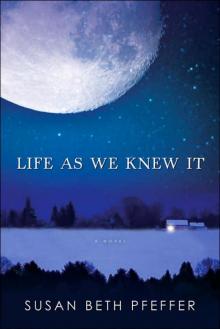 Last Survivors 01 - Life as We Knew It
Last Survivors 01 - Life as We Knew It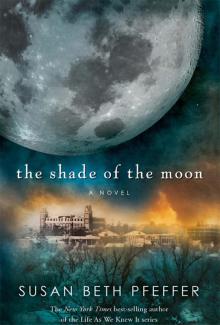 Last Survivors 04: Shade of the Moon
Last Survivors 04: Shade of the Moon Thea at Sixteen
Thea at Sixteen Kid Power
Kid Power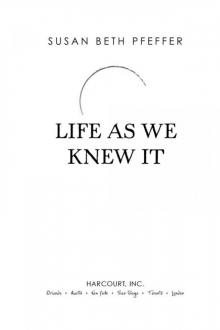 Life as We Knew It
Life as We Knew It This World We Live In
This World We Live In Meg at Sixteen
Meg at Sixteen Blood Wounds
Blood Wounds The Beauty Queen
The Beauty Queen Most Precious Blood
Most Precious Blood The Dead and the Gone
The Dead and the Gone Sybil at Sixteen
Sybil at Sixteen Evvie at Sixteen
Evvie at Sixteen Getting Even
Getting Even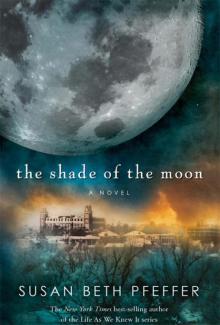 Shade of the Moon ls-4
Shade of the Moon ls-4 The Dead and Gone
The Dead and Gone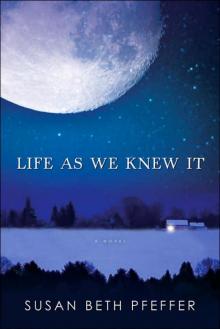 Life As We Knew It lawki-1
Life As We Knew It lawki-1 Fantasy Summer
Fantasy Summer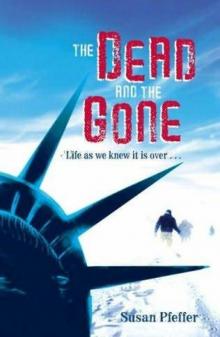 The Dead and the Gone ls-2
The Dead and the Gone ls-2 This World We Live In ls-3
This World We Live In ls-3 This World We Live In (The Last Survivors, Book 3)
This World We Live In (The Last Survivors, Book 3)